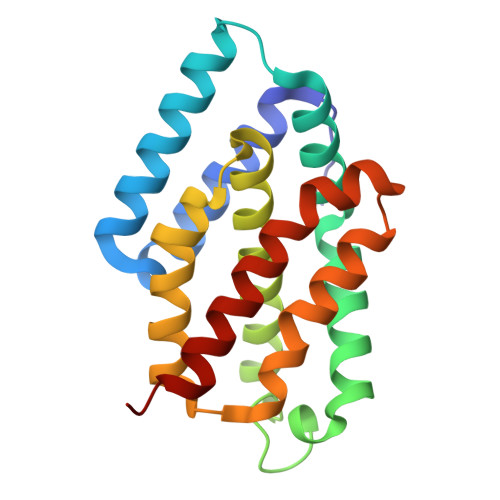Using Protein Design and Directed Evolution to Monomerize a Bright Near-Infrared Fluorescent Protein.
Hu, X., Xu, Y., Yi, J., Wang, C., Zhu, Z., Yue, T., Zhang, H., Wang, X., Wu, F., Xue, L., Bai, L., Liu, H., Chen, Q.(2024) ACS Synth Biol 13: 1177-1190
- PubMed: 38552148
- DOI: https://doi.org/10.1021/acssynbio.3c00643
- Primary Citation of Related Structures:
8J1W, 8J1X, 8Y33 - PubMed Abstract:
The small ultrared fluorescent protein (smURFP) is a bright near-infrared (NIR) fluorescent protein (FP) that forms a dimer and binds its fluorescence chromophore, biliverdin, at its dimer interface. To engineer a monomeric NIR FP based on smURFP potentially more suitable for bioimaging, we employed protein design to extend the protein backbone with a new segment of two helices that shield the original dimer interface while covering the biliverdin binding pocket in place of the second chain in the original dimer. We experimentally characterized 13 designs and obtained a monomeric protein with a weak fluorescence. We enhanced the fluorescence of this designed protein through two rounds of directed evolution and obtained designed monomeric smURFP (DMsmURFP), a bright, stable, and monomeric NIR FP with a molecular weight of 19.6 kDa. We determined the crystal structures of DMsmURFP both in the apo state and in complex with biliverdin, which confirmed the designed structure. The use of DMsmURFP in in vivo imaging of mammalian systems was demonstrated. The backbone design-based strategy used here can also be applied to monomerize other naturally multimeric proteins with intersubunit functional sites.
Organizational Affiliation:
Department of Rheumatology and Immunology, The First Affiliated Hospital of USTC, Center for Advanced Interdisciplinary Science and Biomedicine of IHM, Hefei National Center for Interdisciplinary Sciences at the Microscale, Division of Life Sciences and Medicine, University of Science and Technology of China, Hefei, Anhui 230027, China.















